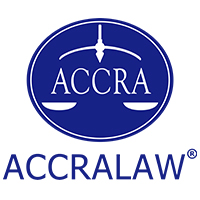Philippine President Rodrigo Duterte signed into law Republic Act No. 11659 on 21 March 2022, which most notably provides a definition for public utility in the Public Service Act, effectively limiting the scope of public utility operations, which are subject to the nationality or foreign ownership restrictions under the Philippine Constitution.
For decades, the definition of public utility, which broadly equated to public service in the Public Service Act, relied on jurisprudence.
With the latest amendment, the term is limited to the operation, management or control for public use of: electricity distribution; electricity transmission; petroleum and petroleum products; pipeline transmission systems; water pipeline distribution systems and wastewater pipeline systems including sewerage pipeline systems; seaports; and public utility vehicles.

Associate at the corporate and special projects department
ACCRALAW
Due to the amendment, the operation, management and control of other public services – which were previously considered public utilities – are open to full ownership by foreign entities. The aim is to liberalise previously restricted service industries to encourage private enterprise and foreign investment. Not surprisingly, the issue is generating much discussion.
Another notable amendment is in section 6, amending section 16 of the Public Service Act, which seemingly restricts individuals from being granted a franchise for the operation, maintenance or control of a public service.
Note that the old provision reads:
“(a) To issue certificates … Provided, that thereafter certificates of public convenience and certificates of public convenience and necessity will be granted only to citizens of the Philippines … or to corporations, co-partnerships, associations or joint-stock companies constituted and organised under the laws of the Philippines.”
Meanwhile, the amended provision now reads:
“(a) To issue certificates … Provided, that any certificate authorising the operation, maintenance or control of a public service shall only be issued to corporations, partnerships, associations or joint-stock companies that are constituted and organised under the laws of the Philippines.”
The removal of “citizens of the Philippines” is interesting, since this makes individuals ineligible to apply for and be issued any franchises, certificate of public convenience, or certificate of public convenience and necessity for the operation, maintenance or control of a public service, including a public utility.
In other words, the Public Service Act as amended now only allows such franchise or certificates be issued in favour of corporations, partnerships, associations or joint-stock companies that are constituted and organised under the laws of the Philippines – or simply, domestic Philippine entities.
So what will now happen to franchises, certificates of public convenience, or certificates of public convenience and necessity issued in favour of individuals?
The most common of these are certificates of public convenience issued by the Land Transportation Franchising and Regulatory Board to individual operators of public utility vehicles such as jeepneys, UV express, mini-buses and taxis; and franchises issued by local government units to individual operators of public utility tricycles.
As commuters are well aware, many of these individual franchise holders are usually the drivers of the public utility vehicles themselves, operators of only a small number of public utility vehicles or both, playing a single route within a locality. With respect to public utility tricycles, the operations of which are generally limited within a specific city or municipality, unless operated by co-operatives, they are most likely operated by individuals.
Thus, it is probably fair to wonder whether the removal of “citizens of the Philippines” in section 16 of the amended Public Service Act was a mere oversight. Otherwise, did congress really intend to corporatise the operation, maintenance and control of all public utility vehicles, including jeepneys, UV express, mini-buses, taxis and tricycles?
For now, the public can only wait for the implementing rules and regulations to be issued by the administrative agencies affected by the amendments – especially those to be issued by the Department of Transportation and the Land Transportation Franchising and Regulatory Board.
Nevertheless, since the Public Service Act has been amended as currently worded, individual public utility vehicle operators may have reached the terminal.
MERVIN KENNETH C IGNACIO is an associate at the corporate and special projects department of ACCRALAW

ACCRA Law Offices
22nd Floor, ACCRALAW Tower, 2nd Avenue corner
30th Street, Crescent Park West, Bonifacio Global City,
1635 Taguig, Metro Manila, Philippines
Contact details:
Tel: +63 2 8830 8000
Email: slrabaya@accralaw.com


























